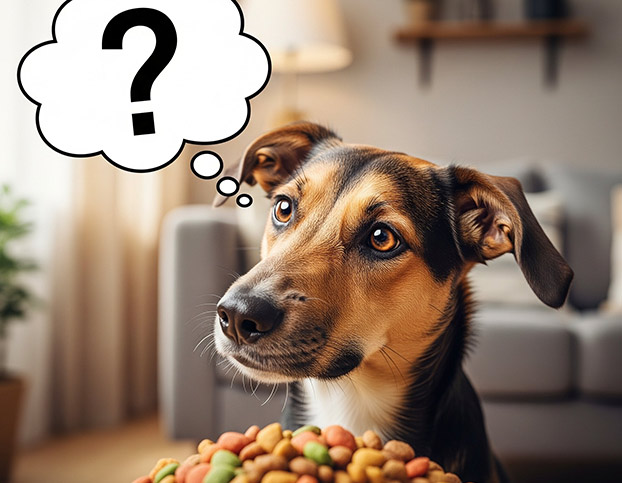As pet owners in Savannah, we’ve all been there: you finally find a pet food your furry friend adores, only for them to turn their nose up at it a few weeks later. So you try a new diet and they love it, but only for a short time. You then try another diet, and the cycle begins again. It’s frustrating, costly, and leaves you wondering, “Is my pet just picky, or is something more going on?”
At Savannah Veterinary Internal Medicine, we understand this common problem. In fact, it is one of the most common things that our clients are concerned about (so you are not alone!). While it’s easy to label our beloved pets as “fussy eaters,” the truth is often more complex, based in behavioral learning and sometimes, actual medical issues. Let’s dive into the science behind your pet’s ever-changing food preferences.
More Than Just “Picky”: The Science Behind Food Refusal
When your pet suddenly rejects a food they once loved, it’s rarely about boredom in the human sense. Here are the key factors, supported by veterinary research, that might be at play:
- The Power of a Bad Memory: Food Aversion
Imagine eating your favorite Shrimp and Grits in a charming Savannah restaurant, only to come down with a bad stomach bug later that day. Even if the meal wasn’t the cause (did you wash my hands after being in that Uber?), you might find yourself avoiding that dish, or even that restaurant, for a while. Both dogs and cats experience a similar phenomenon called conditioned food aversion.It’s Science: Research in animal behavior shows that if a pet experiences discomfort, nausea, or illness after eating a particular food, they can quickly form a negative association with it. This association can be incredibly strong, even if the food itself was perfectly fine and the illness was due to something else entirely (like a mild bug, stress, or a developing health issue).
The Cycle: Your pet might eat a new food enthusiastically because it has no prior negative association. But if, for any reason, they feel unwell after consuming it, their brain links that discomfort to the food. This leads to refusal, prompting you to switch, and the cycle continues.
- The Hidden Culprit: Subtle Medical Conditions
Often, what appears to be “picky eating” is actually a symptom of an underlying medical problem. Many health issues can cause a pet to lose their appetite or become selective about what they eat. These conditions can be intermittent or mild in their early stages, making the “on-again, off-again” pattern even more perplexing.
- Gastrointestinal Distress: This is a big one for both species. Conditions like inflammatory bowel disease (IBD), intestinal small cell lymphoma (cats), pancreatitis (which in cats can be part of a ‘triaditis’ involving liver and intestines), or food sensitivities can cause ongoing or intermittent nausea and discomfort after eating.
- Dental Pain: For both dogs and cats, a fractured tooth, inflamed gums, or other oral pain can make chewing uncomfortable.
- Systemic Illnesses: Early stages of kidney disease, liver issues, cancers or certain infections can all impact appetite.
- Upper Respiratory Infections (URIs) in Cats: A congested nose from a URI can severely diminish a cat’s sense of smell, making food unappealing regardless of hunger.
- Stress and Environment: Cats are incredibly sensitive to their surroundings. Changes in routine, new pets, loud noises, or even a dirty food bowl can induce stress and lead to a dramatic decrease in appetite.
Why an Internist? If your pet has had initial tests run and their eating habits remain a mystery, a consultation with a board-certified veterinary internal medicine specialist may help. At Savannah Veterinary Internal Medicine, we frequently diagnose and manage complex gastrointestinal, liver, and kidney disorders that cause appetite changes. We have tools like endoscopy and ultrasound, and specialized training to pinpoint these subtle, complex conditions. We’re dedicated to solving complex problems and getting to the root cause of your pet’s symptoms.
- The Learned Behavior: Reinforcing the “Picky” Habit
Pets are incredibly intelligent and learn quickly what behaviors get them what they want.- Attention & Reward: If refusing food consistently leads to you offering a more tempting meal (or even just more attention and coaxing), your pet learns that being “fussy” yields a better outcome. They’re not necessarily “bored,” but rather, they’ve been inadvertently trained to “hold out” for something better.
- Novelty Factor: Pets can also have a temporary preference for novelty. A new food is exciting! But once it becomes routine, its appeal can wane, prompting the desire for something new again.
When to Seek Expert Help from Savannah Veterinary Internal Medicine
If your pet’s eating patterns are concerning you, don’t just keep switching foods indefinitely. It’s time to see your veterinarian, and if needed, consult with an internal medicine specialist.
Contact Savannah Veterinary Internal Medicine if your pet:
- Refuses food for more than 24-48 hours, especially if other symptoms like vomiting, diarrhea, lethargy, or pain are present.
- For cats, it’s especially critical to act quickly. If a cat goes without eating for more than 24-48 hours, they are at significant risk of developing hepatic lipidosis (fatty liver disease), a life-threatening condition, particularly in overweight cats. This makes prompt veterinary attention an absolute must for felines.
- Consistently refuses their primary diet, even when you try different options.
- Shows a preference for only treats or human food, while rejecting their balanced diet.
- Exhibits other concerning signs like excessive drooling, difficulty chewing, or changes in thirst or urination.
At Savannah Veterinary Internal Medicine, we take a comprehensive approach. Our one-on-one consultations allow us to gather a complete history, understanding your pet’s symptoms from your unique perspective. We then, through testing, create a complete picture of your pet’s health. Our goal is to solve the puzzle of their appetite, get them back on a consistent, healthy diet, and ensure they thrive in our beautiful Savannah community.
Don’t continue buying foods that your pet just won’t eat. Reach out to Savannah Veterinary Internal Medicine today, and let’s get your furry family member back to enjoying their meals once again!

Author:
James Woods DVM, MS, DACVIM (SAIM)
Ph: (912) 721-6410
Contact Us
